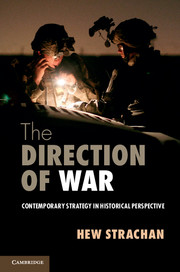Book contents
- Frontmatter
- Contents
- Acknowledgements
- Introduction
- 1 War and strategy at the beginning of the twenty-first century
- 2 The meaning of strategy: historical perspectives
- 3 The case for Clausewitz: reading On war today
- 4 Making strategy work: civil–military relations in Britain and the United States
- 5 Strategy and the limitation of war
- 6 European armies and limited war
- 7 The limitations of strategic culture:the case of the British way in warfare
- 8 Maritime strategy and national policy
- 9 Technology and strategy
- 10 War is war: imperial legacies and current conflicts
- 11 Strategy and the operational level of war
- 12 Strategy and contingency
- 13 Strategy: change and continuity
- Notes
- Index
5 - Strategy and the limitation of war
Published online by Cambridge University Press: 05 June 2014
- Frontmatter
- Contents
- Acknowledgements
- Introduction
- 1 War and strategy at the beginning of the twenty-first century
- 2 The meaning of strategy: historical perspectives
- 3 The case for Clausewitz: reading On war today
- 4 Making strategy work: civil–military relations in Britain and the United States
- 5 Strategy and the limitation of war
- 6 European armies and limited war
- 7 The limitations of strategic culture:the case of the British way in warfare
- 8 Maritime strategy and national policy
- 9 Technology and strategy
- 10 War is war: imperial legacies and current conflicts
- 11 Strategy and the operational level of war
- 12 Strategy and contingency
- 13 Strategy: change and continuity
- Notes
- Index
Summary
On 22 January 2003 the US Secretary of Defense, Donald Rumsfeld, angered by France and Germany’s reluctance to embrace the war on Iraq, characterised them as the states of ‘old Europe’. Those more familiar with the history of the continent were quick to point out that a refusal to go to war was in fact a truer reflection of ‘new Europe’. In the first half of the twentieth century ‘old Europe’ had been far too quick to fight, with dire consequences for its member nations in 1914–18 and 1939–45, and as a result it had created institutions in the second half of the century, most obviously the European Union, designed precisely to prevent that eventuality. Rumsfeld’s utterances have become the stuff of satire, but in this case we need to dig a bit deeper. However deficient his tact, however flawed his diplomacy and however inadequate his grasp of history, Rumsfeld had hit an exposed nerve. For Europeans, who grew up not only with the legacy of the two world wars but also in the shadow of the Cold War, the norm that war can be an instrument of policy, however compelling its apparent logic, is counter-intuitive.
The mix of the rational with the visceral in this opening paragraph is itself instructive. Because there was no war in Europe, Europeans became used to the idea that war itself had no utility. Even those, who, thinking historically, accepted that war against Adolf Hitler was justified, pulled back from embracing war against Leopoldo Galtieri or Slobadan Milosević. The incredulity which greeted the outbreak of war in 1982, when Britain fought to regain the Falkland Islands from Argentina, or in 1999, when NATO used air power to coerce Serbia over Kosovo, was not necessarily inspired by pacifism. Pacifists, however strident and impassioned their tone, also use powerfully articulated arguments. The overwhelming response was more emotional: it was one of surprise, even of shock. The dominant instrument of Cold War strategic thought, deterrence, had created the assumption that real wars were things of the past, not of policy.
- Type
- Chapter
- Information
- The Direction of WarContemporary Strategy in Historical Perspective, pp. 98 - 118Publisher: Cambridge University PressPrint publication year: 2013



